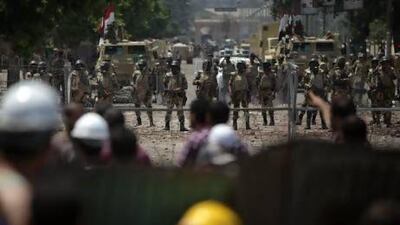CAIRO // Egypt was plunged into further turmoil yesterday after at least 51 people were killed and 435 injured in what supporters of the deposed president Mohammed Morsi called a massacre.
Eight women and four children aged from six months to 11 were among the dead in the bloodiest violence since the 2011 uprising that forced Hosni Mubarak from power.
The bloodshed threatened to transform political rifts into street violence five days after Mr Morsi was forced from office in a widely popular coup.
Leaders from across Egypt's political spectrum condemned the attacks and called for an immediate investigation into the deaths in the early hours of yesterday at a pro-Morsi protest sit-in outside the Republican Guard barracks in Cairo where he is believed to be held.
Two conflicting narratives of the incident emerged yesterday.
Witnesses interviewed by The National said violence broke out after the police and army opened fire on their sit-in at dawn with shotguns and tear gas. Inside Rabaa Adaweya mosque, where a makeshift hospital was set up, they pointed to serious wounds and held up spent shells and tear-gas canisters as proof.
Gehad El Haddad, a Muslim Brotherhood spokesman who said he witnessed the events, called the attacks a bloodbath and a massacre. A statement from the Brotherhood immediately after the attacks called for an uprising.
However, the police and army strongly denied opening fire first. Spokesmen said the security forces had no choice but to defend themselves and government buildings after their officers were attacked by armed Morsi supporters at the sit-in.
The army released grainy footage from cameras mounted on helicopter gunships showing attackers firing on troops and men throwing objects on to the soldiers from rooftops.
The army spokesman, Ahmed Aly, said the casings held up by pro-Morsi protesters as proof of violence against them were in fact proof that guns were used by people in the demonstrators' midst. At least two of the dead were soldiers.
Whatever the truth, the bloodletting has driven a wedge into Egyptian society and politics. Mohamed ElBaradei, the Nobel Prize-winning opposition leader, demanded an "immediate, independent and transparent investigation".
Ahmed El Tayyeb, the Grand Sheikh of Al Azhar, threatened to retreat into seclusion until violence ceased.
Both men featured prominently in the military press conference last week to announce Mr Morsi's removal and the suspension of the constitution, bolstering the image that the dramatic move was backed by the majority of Egyptians.
Before yesterday's attack, the new political transition was already under threat after the ultraconservative Al Nour party refused to back the interim president's choice of Mr ElBaradei as prime minister. The inclusion of Al Nour in the "road map for the future", as the military called its transition plan, was important because it gave the image that the removal of Mr Morsi was not a move against followers of political Islam, but against a deeply unpopular president whose decisions put the country on a path to chaos.
Nader Bakkar, a spokesman for Al Nour, said the party was completely withdrawing from the transition process after yesterday's "massacre".
Abdel Moneim Aboul Fotouh, a prominent critic of Mr Morsi who was kicked out of the Brotherhood for disobedience, called on interim president Adly Mansour to resign after the attacks.
The killing of pro-Morsi protesters also narrowed any chance of the Brotherhood agreeing to take part in a national reconciliation initiative led by Mr Mansour, the former Supreme Constitutional Court chief justice.
Amr Darrag, head of the foreign relations committee of the brotherhood's Freedom and Justice Party, said the military's violence was proof that "dictatorship has returned to Egypt".
"It's not about Mohammed Morsi any more," he said. "The people protesting are opposing military rule now. They are shocked at the scenes of the military killing Egyptians."
Mr Darrag vowed that protests would continue "without violence or use of force until the world realises they are making a big mistake by supporting this coup".
"No one wants to see what has been happening in Syria happen in Egypt," he said.
A security official said prosecutors later ordered the closure of the FJP's Cairo headquarters after police discovered weapons they alleged would be used against Morsi opponents.
The scene outside Rabaa Adaweya mosque was a testament to the emotions of pro-Morsi supporters yesterday, with lines of weeping men praying hours after the attack.
Many of them seemed stunned by the bloodshed. One 25-year-old student at Al Azhar university, who gave his name as Abu Obeida, said he was shot in the hand as he was running away.
"We felt completely surprised and shocked," he said, his arm in plaster and shirt spattered with blood. "We had been giving dates and water to the Republican Guards, we were not prepared for them to shoot us … we were not prepared with anything to protect ourselves."
But amid the mourning, there was resolve. Abu Obeida and many others vowed that their demonstrations would continue until Mr Morsi was reinstated.
* Additional reporting by Alice Fordham and Agence-France Presse
twitter: For breaking news from the Gulf, the Middle East and around the globe follow The National World. Follow us

